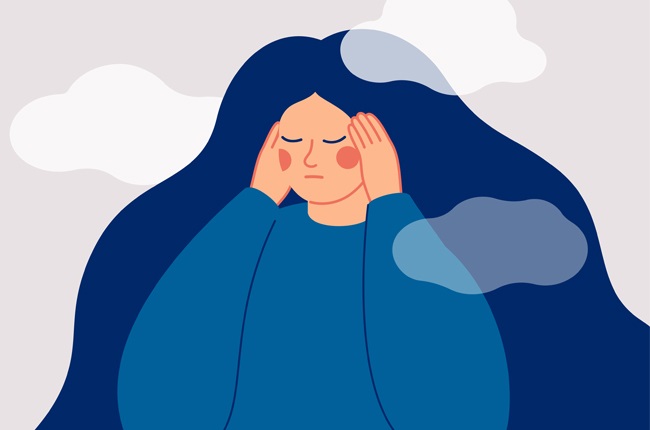
- Anxiety can take a physical toll on your body.
- Experts explain how anxiety can manifest in the body, from stomach issues to increased risk of heart disease.
- They also share some things you can do to help treat anxiety, including mindfulness meditation and cognitive behavioural therapy.
When you hear the word anxiety, it's quite likely that you think of how it makes you feel - confused, nervous, helpless and afraid. But anxiety can take a physical toll, too.
The number of Australians experiencing anxiety disorders has grown by almost 40 per cent in the last four years, according to depression initiative Beyond Blue. And one in four will experience anxiety at some point.
"People can spend years dealing with symptoms such as obsessive thoughts, relentless worrying or panic attacks and think that it's just part of who they are," says Beyond Blue chief executive Kate Carnell. "In fact, they could be living with an undiagnosed anxiety condition that can severely limit their ability to function day to day!"
Anxiety begins in the brain, in an area called the amygdala, which controls our emotional response. Messages are carried from the brain to our sympathetic nervous system, and those messages can trigger a raft of physical symptoms, as well as emotions.
"These physical effects can include hot flushes, dizziness, digestive complaints, knots in the stomach, sweaty palms and cardiovascular and respiratory symptoms," says Dr Jerome Sarris from the Department of Psychiatry at the University of Melbourne.
Here, the experts explain how anxiety can manifest in your body and affect your health.
READ MORE | Obsessive compulsive disorder is more common than you think - but it can take 9 years for a diagnosis
Your stomach
Anxiety appears to make the nerves controlling our digestion more sensitive, and this can lead to stomach pain, bloating, diarrhoea, constipation and nausea.
It starts with anxiety triggering the release of natural chemicals in our body called adrenaline and cortisol - also known as the 'stress' hormones. "This arouses the sympathetic nervous system and can have digestive consequences," says Dr Sarris.
Interestingly, research at McMaster University in Canada has found a link between an upset in the balance of gut bacteria and increased anxiety and stomach upsets.
Your skin
Anxiety can also affect your skin, making it feel flushed, sweaty and clammy. "When you're anxious, you get more blood pumping to the muscles, adrenalin levels are raised, you breathe harder and faster, and you start to perspire and become flushed because you are getting ready to 'fight' or to take 'flight' and run away" explains Dr Sarris.
Your heart
High anxiety has been linked to increased risk of heart disease as it raises heart rate and blood pressure. The US Nurses' Health Study, a large survey conducted every two years, found women with higher levels of anxiety were 59 per cent more likely to have a heart attack than women with the lowest anxiety levels. Another large-scale study, the Women's Health Initiative, tracked 3300 post-menopausal women and also found that those who had a history of panic attacks tripled their risk of heart attack or stroke.
READ MORE | People's happiness not impacted by Covid-19 pandemic, new study finds
Your sleep
If you're suffering from anxiety, you're also likely to be chronically sleep deprived and feeling exhausted. "At night time, the body is meant to cool down, body temperature drops, and you get a drop in cortisol as well," says Dr Sarris. "But in cases of chronic anxiety, cortisol is raised, and the sympathetic nervous system increases body heat, the opposite of what we need for sleep."
To make matters worse, researchers at the University of California, Berkeley, have found a lack of sleep irritates or disrupts areas of the brain that process emotions.
"By restoring good quality sleep in people suffering from anxiety, we may be able to help ameliorate their excessive worry and disable fearful expectations," says UC Berkeley researcher and psychologist Allison Harvey.
Your breathing
Shortness of breath and hyperventilation are two of the most common physical effects of anxiety. The panicked breathing occurs because many parts of your body are working together to help you get ready to fight or take flight. Blood flow can increase by 300 to 400 per cent when you're anxious; your spleen produces more red and white blood cells to carry more oxygen around your body, and your breathing also speeds up as your lungs try to take in more oxygen.
Anxiety has also been found by U.S. researchers to be more common in people with chronic obstructive pulmonary disease (COPD). COPD causes inflammation of the airways and a loss of elasticity in the lungs, which makes filling our lungs with air much harder.
Your muscles
If you're constantly on alert for a perceived threat, your body is likely to tense up, resulting in all sorts of aches and pains, including a sore jaw or back and even tension headaches.
But if you're tensing your muscles to deal with anxiety, it could be a natural way of dealing with the psychological impact, research suggests. "Anxious individuals may tense their muscles in order to alleviate the emotional distress of anxiety," says research in the Journal of Anxiety Disorders.
READ MORE | Want to get healthier? Start by changing your mindset with these expert tips
What can help?
- Some medications, such as benzodiazepines, may be prescribed in the short term - two or three weeks - to help manage anxiety.
- Cognitive behaviour therapy (CBT) involves you recognising that how you think and act affects the way you feel. CBT looks at the thoughts that come into play when we're anxious and replaces them with new thought patterns and messages that enhance our sense of being able to cope.
- 'Graded exposure' may be part of treatment for anxiety. It involves gradually exposing ourselves to things that make us anxious so we realise these situations aren't as bad as we feared.
- Mindfulness meditation focusing on breath and body sensations can help decrease anxiety by up to 39 per cent, say scientists from the Wake Forest Baptist Medical Centre in the US. Brain scans show meditation works on areas of the brain that govern worrying, thinking and emotion.
- Progressive muscle relaxation can help. To try it, tense one muscle group at a time for about five seconds so you can feel tension, but no pain, then relax the muscles for 10 seconds. Work on the buttocks, thighs, upper arms, shoulders and mouth and jaw - open your mouth as if you're yawning.
- "Caffeine stimulates the nervous system. So reduce or avoid caffeine in coffee, tea and soft drinks," says Dr Sarris. Beyond Blue recommends a limit of two cups of caffeine drink per day at the most.
- Omega-3 supplements may reduce anxiety by up to 20 per cent, shows a small study at Ohio State University in the US. It's believed omega-3 fatty acids lower the production of cytokines, molecules that stimulate inflammation and may contribute to anxiety. The supplements in the study contained four or five times the amount of fish oil in a serving of salmon - a 150g serving of salmon contains 500 mg to 850 mg of omega-3s. The study participants received around 2.5g of omega-3s.
READ MORE | Four habits of happy people -- as recommended by a psychologist
- Slow breathing exercises stave off feelings of light-headedness and encourage calmer, clearer thinking. The Australian Psychological Society recommends breathing through your nose to the count of three, then breathing out to the count of three, and repeating this for two or three minutes.
- Exercise can help mild-to-moderate anxiety as it improves mood by releasing the brain's feel good chemicals, endorphins, and improves sleep. "You get an acute release of adrenalin, your heart pumps, and you display some fight or flight manifestations, but the brain and body adapt to this with regular exercise," says Dr Sarris.
- Magnesium is important for preventing anxiety, and promoting muscle relaxation, says Dr Sarris. Good sources of this mineral include spinach, beans, peas, nuts, seeds and whole grains.
Source: AREMEDIASYNDICATION.COM.AU/MAGAZINEFEATURES.CO.ZA




 Publications
Publications
 Partners
Partners












